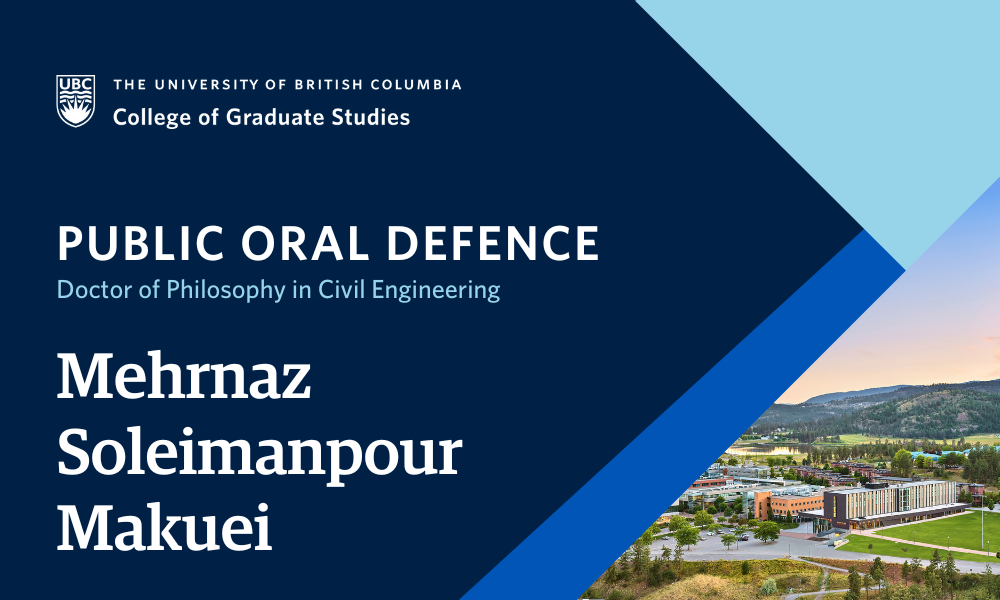
- This event has passed.
Dissertation Defence: Ultraviolet Disinfection of Unfiltered Water Supplies: Exploring Effects of Particle-Microorganism Association and Efficiency Enhancement Strategies
May 1, 2024 at 12:30 pm - 4:30 pm

Mehrnaz Soleimanpour Makuei, supervised by Dr. Nicolas Peleato, will defend their dissertation titled “Ultraviolet Disinfection of Unfiltered Water Supplies: Exploring Effects of Particle-Microorganism Association and Efficiency Enhancement Strategies” in partial fulfillment of the requirements for the degree of Doctor of Philosophy in Civil Engineering.
An abstract for Mehrnaz Soleimanpour Makuei’s dissertation is included below.
Examinations are open to all members of the campus community as well as the general public. Please email nicolas.peleato@ubc.ca to receive the Zoom link for this defence.
ABSTRACT
Traditional quality indicators used in water treatment facilities have limitations in assessing particle-related challenges and system performance under challenging conditions. This study seeks to explore the impacts of particle-microorganism interactions on ultraviolet (UV) disinfection performance, identify water quality indicators that best describe performance, and suggest innovative methodologies to mitigate these effects on disinfection performance.
Several sampling points of two full-scale treatment plants, receiving surface water without filtration, were monitored to identify the impacts of particulates on UV performance. The research established a link between zeta potential or surface charge and disinfection effectiveness and results suggest that conventional water quality indicators do not adequately capture particle effects on UV disinfection. An examination of methods for detecting particle-microorganism associations was conducted to devise an experimental approach in line with contemporary research directions and supported by a reasonable theoretical foundation.
To further explore the impact of challenging source conditions on UV disinfection, the second objective was to study a wider variety of water conditions. Results suggested that disinfection could be compromised even at low turbidities (< 1 NTU), depending on the water matrices. Furthermore, complex interactions with background source water quality and additional particulate and dissolved matters were observed and suggested that non-specific indicators (turbidity or UVT) as opposed to specific indicators (zeta potential) should be used with caution when predicting the UV performance specifically under challenging conditions. Overall, zeta potential enhanced UV disinfection predictability.
The observed influence of zeta potential on UV performance led to proposing a UV enhancement strategy in relation to problems regarding particles. A new line of study was started to identify if manipulating particle-microorganism associations through zeta potential modifications was viable as disinfection enhancement strategy. Assessing zeta potential manipulation effects on water quality using bacterial and viral surrogates showed that samples with highly negative zeta potential result in reduced particle-microorganism associations and increasing disinfection efficacy.
This research highlights the limitations of conventional indicators in assessing UV disinfection in challenging conditions. Zeta potential emerged as a key factor in improving assessment, leading to exploration of a novel pre-treatment approach for facilities that may experience significant impacts due to particulates.